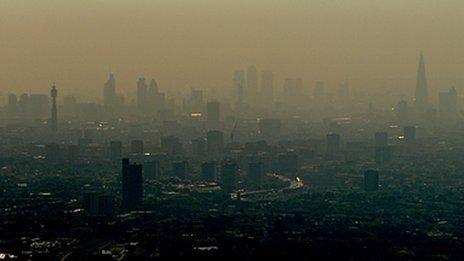Court reserves UK air quality ruling
- Published

The Supreme Court has reserved judgement on the UK's breaches of EU air pollution laws.
The government admits air quality laws will be breached in 15 regions until 2020.
Londoners will have to wait until 2025 for pollution to enter legal limits.
Pollution levels in affected areas are a health risk to people on many of Britain’s busiest streets, especially those with heart or lung problems.
The government says the laws are unrealistically strict.
The BBC understands that it also believes the European Commission is partly to blame because it did not set proper limits on pollution from diesel exhausts in the first place.
The High Court and later the Court of Appeal refused to take action on the issue, ruling that enforcement was a matter for the European Commission.
An environment charity, ClientEarth, will now argue in the Supreme Court that the national courts must enforce EU environment law in the UK.
About 29,000 early deaths each year in the UK are blamed on air pollution – more than obesity and alcohol combined (although air pollution tends to shorten people’s lives by a shorter time).
Pollution from road traffic, particularly diesel fumes, is the most significant cause of poor air quality in most cities. The pollutants of most concern are tiny airborne particles, "PM10s", and nitrogen dioxide.
Alan Andrews, for ClientEarth, told BBC News: “It’s a disgrace that we won’t achieve compliance by 2020 or 2025 – and it’s made worse that the British government is lobbying to weaken the limits because it claims they are unrealistic."
BBC News understands that the European Commission is encouraging the Supreme Court case because it would prefer to avoid a direct confrontation with the UK, which is objecting to other EU environmental rules.
The timing for the government is unfortunate. This week it was forced to issue a severe pollution warning on air quality in London, with some pollution monitors registering 10/10.
Simon Birkett, Founder and Director of Clean Air in London, said: “If the Supreme Court does not require action, the European Commission must."
A Defra spokesman said: “Our air quality has improved significantly in recent decades and most of the UK meets EU air quality limits for all pollutants. Our plans for nitrogen dioxide set out all the important work being done to meet EU standards in the shortest possible time.”
The government says it has tried to reduce emissions of nitrogen dioxide through tax breaks and subsidies for low emission vehicles. It has invested £75m to support green bus technologies and £560m for local sustainable transport and given around £3m in grants to local authorities every year since 2010 to help them tackle pollution on a local level.
However, the government's drive to reduce CO2 emissions blamed for changing the climate has partly contributed to the problem, by encouraging drivers to turn to diesel vehicles.
Follow Roger on Twitter
- Published8 August 2012
- Published17 April 2012